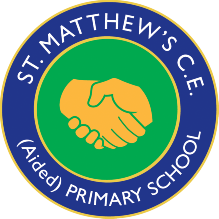Curriculum
Curriculum Statement
Our Curriculum Intent:
At St Matthew’s we are passionate about providing our children with an engaging and broad curriculum, that is rooted in our Christian values and TEAM spirit.
We are ‘Individuals working together to potential with God’ so
“I can do all things because Christ gives me strength”
Philippians 4:13
Our curriculum has four key drivers:
 |
ThankfulnessRespect We have Respect for other's beliefs, belongings and points of view. |
 |
EnjoymentWe enjoy learning, engaging in a range of lessons across a broad curriculum.
|
 |
AmbitionResilienceWe develop Resilience and high aspirations that supports us to succeed |
 |
MissionResponsibilityWe are Responsible members of the community, understanding the world around us and how we can make a difference. |
Our curriculum drivers are underpinned by our 3R’s.

These drivers are interwoven into our wider curriculum through:
- Whole school events and celebrations
- Assemblies
- Charity and community days
- A range of intervention programmes
Every child, who attends our school, is given every opportunity to succeed. We aim to provide an ambitious curriculum which enables all learners, in all pupil groups, to be successful in being the best that they can be, a curriculum which enhances purposeful learning, ensuring depth, breadth, balance and progression. This is achieved through our carefully planned sequenced curriculum and continual pastoral support. Our aim is for every individual is provided with the opportunity to flourish spiritually, morally, emotionally, physically and intellectually.
Through the promotion of Christian values, British Values and diversity within our curriculum, we aim for our children to be tolerant and responsible individuals, who are resilient, responsible and respectful. We set high expectations for achievement in that our children will leave St Matthew’s as model British citizens, reaching age–related expectations, identifying their aspirations for the future and being ‘secondary school ready’.
Our curriculum is carefully sequenced towards building knowledge so that all children, despite their starting points or individual needs, know more and remember more, supporting future learning and employment. This will enable children to make links with previous learning, whilst over time, build their subject knowledge with increasing complexity and retain it in their long-term memory.
Curriculum content in all foundation subjects is planned on a two-yearly rolling cycle so that children build on prior learning. Our curriculum also considers the journey a pupil will take through our school - due to a 40-pupil cohort, we have split classes across all year groups - this can mean that children have different pathways through school over their seven years at St Matthew’s.
At St Matthew’s will enable pupils to develop the resilience to persevere with their learning, to investigate, reason and reflect, within a learning community that encourages taking risks and making decisions to achieve individual potential.
Our curriculum ensures all children develop foundational knowledge and skills that every child needs by the end of key stage 1 to give them the best chance of educational success. This includes communication, reading, writing, calculation and the general knowledge of the wider world.
Reading and language development is at the heart of our curriculum. We ensure a rigorous approach to the teaching of early reading developing a learners’ confidence and enjoyment in reading. At the early stages of learning to read, reading materials are closely matched to learners’ phonics knowledge.
Ensuring that our children are active and engaged in their learning, enables them to achieve their highest potential.
Our Curriculum Implementation:
Outcomes are designed to meet the requirements of the National Curriculum but also to develop the knowledge and attributes needed for future learning and beyond.
To ensure that progression and balance is maintained in mixed year groups and non-mixed classes, we follow a two-year curriculum cycle in History and Geography and have clear, subject overviews for every foundation subject which indicate how we ensure complete coverage of the National Curriculum. Progression documents detail how learning builds and paves the way for future learning, through the carefully considered teaching of key knowledge and skills. Theses guide teachers in their planning with clearly identified substantive and disciplinary knowledge and skills.
Children’s title pages show unit specific knowledge and vocabulary that children will learn through the unit of work. These are used by the teacher to assess the knowledge, skills and vocabulary acquired.
Our phonics scheme, Read, Write Inc, supports children to gain phonological knowledge to develop fluency and confidence in reading. Children access phonetically decodable books in school and as part of our home learning offer. Children also have access to additional texts to share with their parents at home encouraging the development of story language and storytelling.
Curriculum Monitoring and Reviewing
Evaluation is essential for the planning and development of the curriculum. The Senior Leadership Team is responsible for the overall school curriculum. Senior leaders, middle leaders and subject leaders monitor and review by:
- moderating pupil work
- conducting learning walks and pupil voice
- providing CPD and training
- supporting colleagues
- identifying next steps for improvement
Delegated governors have identified areas of responsibility, and they liaise with subject leaders or SLT to monitor identified actions and impact of these on the quality of learning, teaching and provision.
